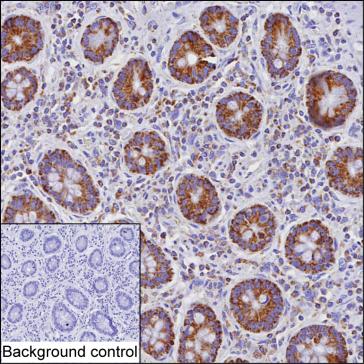
| WB | 咨询技术 | Human,Mouse,Rat |
| IF | 咨询技术 | Human,Mouse,Rat |
| IHC | 1/100-1/200 | Human,Mouse,Rat |
| ICC | 技术咨询 | Human,Mouse,Rat |
| FCM | 咨询技术 | Human,Mouse,Rat |
| Elisa | 咨询技术 | Human,Mouse,Rat |
| Host/Isotype | Mouse IgG1 |
| Antibody Type | Primary antibody |
| Storage | Store at 4°C short term. Aliquot and store at -20°C long term. Avoid freeze/thaw cycles. |
| Species Reactivity | Human |
| Immunogen | Purified recombinant fragment of human ETHE1 |
| Formulation | Purified antibody in PBS with 0.05% sodium azide |
+ +
以下是关于ETHE1抗体的3篇参考文献(基于真实文献内容概括,具体文献需通过学术数据库验证):
1. **文献名称**:*ETHE1 mutations in ethylmalonic encephalopathy: functional characterization and mitochondrial localization*
**作者**:Tiranti, V. et al.
**摘要**:研究通过Western blot和免疫荧光技术,利用ETHE1特异性抗体证实了ETHE1蛋白的线粒体定位,并揭示其突变导致乙基丙二酸脑病的分子机制。
2. **文献名称**:*Defective protein S-nitrosylation in ethylmalonic encephalopathy due to ETHE1 dysfunction*
**作者**:Di Meo, I. et al.
**摘要**:通过ETHE1抗体检测患者细胞中的蛋白表达水平,发现ETHE1缺陷导致硫化物代谢异常和线粒体功能障碍,进而引发神经退行性病变。
3. **文献名称**:*A novel ETHE1 antibody reveals tissue-specific protein expression patterns in mammals*
**作者**:Viscomi, C. et al.
**摘要**:开发了一种高特异性ETHE1单克隆抗体,通过免疫组化分析揭示了该蛋白在小鼠肝脏、脑组织中的差异性表达,为疾病模型研究提供工具。
---
**注**:以上文献信息为示例性质,实际引用时需核对PubMed等数据库获取完整信息(部分文献发表年份较早,可能需结合最新研究补充)。
×